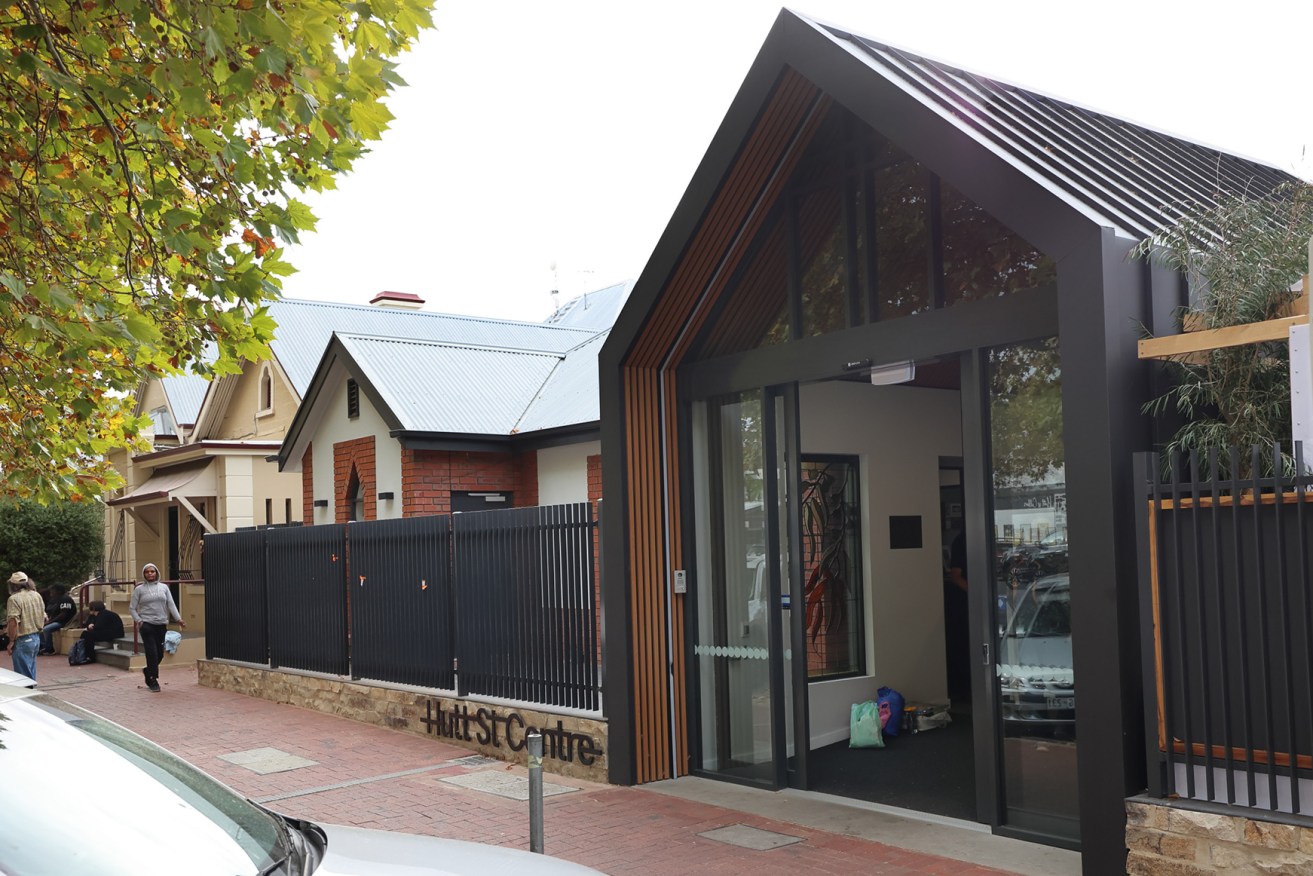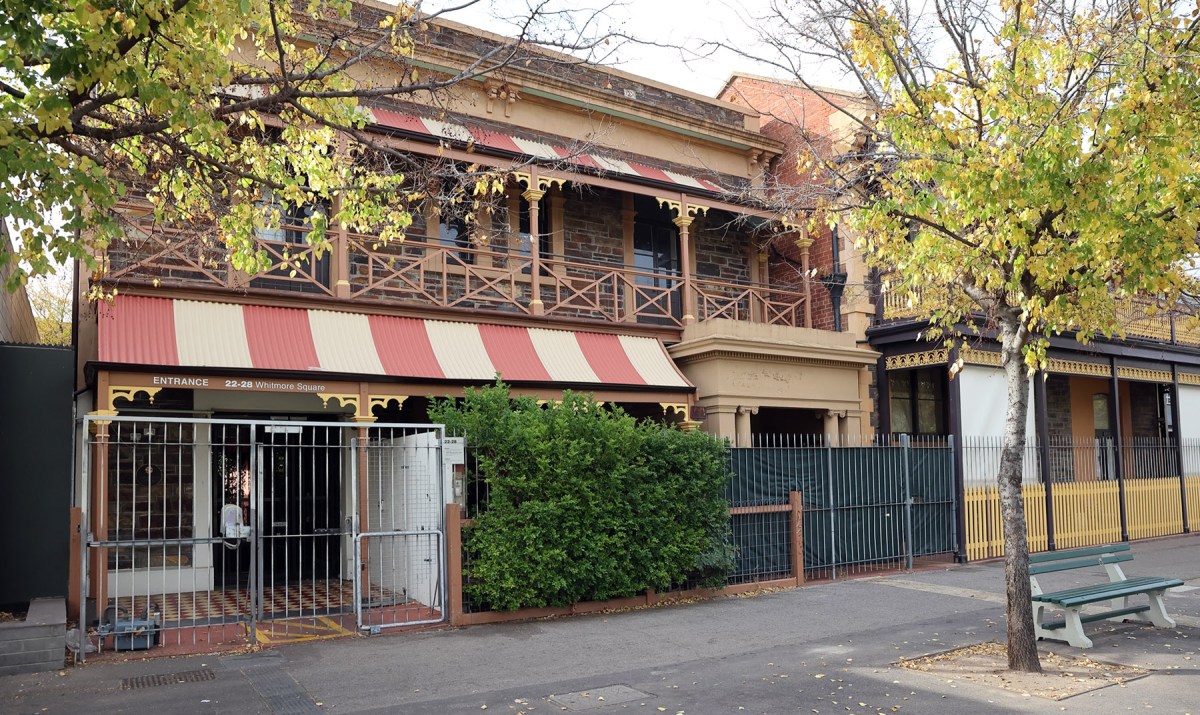‘Human shield’: Ex-Hutt St Centre chief cops flak for budget cuts
The architect of the State Government’s controversial homelessness reform – a former Hutt St Centre CEO – says he hopes that vulnerable people “won’t slip through the cracks” after millions in funding were stripped from his former employer and other agencies, but that “we also know that sometimes in our system these things happen”.


The Hutt Street Centre (Photo: Tony Lewis/InDaily)
Ian Cox, who led the Hutt Street Centre for 16 years, left his role in 2019 to head the Office for Homelessness Sector Integration, set up by Human Services Minister Michelle Lensink to work on “long overdue and much needed” reforms of the state’s homelessness system.
The details were announced on Friday, with Lensink revealing the state’s homelessness services will soon be run by five “alliances” of organisations awarded government contracts through a competitive tender process.
Among the groups to miss out under the new alliance system are the Hutt Street Centre, Catherine House, and the St Vincent de Paul Society – all of which will lose $1.2 million in funding under the reforms.
Vinnies CEO Louise Miller Frost said the cut will force her organisation to move from crisis accommodation to become a boarding house – a longer-term accommodation model.

St Vincent de Paul shelter, Whitmore Square. Photo: Tony Lewis/InDaily
Similarly, Catherine House General Manager Julie Duncan said her organisation would lose the “core funding” for its crisis accommodation centre for women experiencing domestic violence, while Hutt Street CEO Chris Burns said the funding cut will see an end to his centre’s case management programs – breaking what he describes as the “continuum of care”.
Cox – who said he has a number of former colleagues at the Hutt Street Centre and other homelessness organisations – conceded it was a “difficult situation” and the cuts would “absolutely hurt” staff who have been “running their programs for a number of years”.
“Over many years we did try to build Hutt Street, and I would hope that Hutt Street will continue to survive,” Cox told ABC Radio this morning.
“So whilst they won’t get funding in this instance for the Eastern Adelaide program, [I hope] that they’ll continue to provide services for people who are in need.”
However, asked whether he could guarantee that homeless people won’t slip through the cracks when these reforms come into force in July, Cox said: “Look, we’re always hopeful that people won’t slip through the cracks, but we also know that sometimes in our system these things happen”.
“We are looking forward to the future, I think … what we’ve proposed [has] tried to bring organisations together.
“We wanted to structure it so that clients were always the focus of our new alliance system.”
Shadow Human Services Minister Nat Cook said Cox was being used by Lensink to push through the reforms.
“Out of anyone, Ian Cox is being used as a human shield by the minister sadly,” Cook told ABC Radio.
“[He’s] a good bloke, he knows that this is not the methodology that will work within this sector which is not broken.
“It is the housing outcomes [which are broken].”
Cox said he was “absolutely not” a human shield for the minister, and reaffirmed his belief in the new funding model.
“I believe in the reforms, I wanted to see a better system for our client group,” he said.
“I have spent my whole working life worrying about our clients more than even myself, so I think that what we’re looking for are better outcomes into the future.”
Other groups to miss out on funding under the new arrangement include Uniting Communities and the Aboriginal Family Support Services.
The five new homelessness alliances cover the Adelaide South, Adelaide North, Country South and Country North areas, with a separate alliance dedicated to domestic and family violence.
The new alliances – whose member groups specialise in a range of different support services and will be headed by a “lead agency” and a manager – will be required to intervene early to prevent people from falling into homelessness while supporting them in finding long-term housing.
The Hutt Street Centre and the St Vincent de Paul Society missed out on the tender for the Adelaide South alliance, which will be led by Lutheran Care in conjunction with seven other organisations.
Lensink, who emphasised that the overall pool of State Government funding for homeless services has increased from $67.9 million to $71.5 million in the last year, said the organisations that missed out on funding should discuss what services they can continue to provide with the new alliances.
“As part of as part of their bids, [those organisations] had to demonstrate that they could provide all of the services that were required that are existing services,” Lensink said.
“As far as some of the organisations that were part of the unsuccessful tender, they can actually speak to the new group and see what services they might be able to continue.
“So that’s a conversation that those organisations need to have.”
But St Vincent de Paul Society CEO Louise Miller Frost said speaking to other service providers would not secure the continuation of the Men’s Crisis Centre in Whitmore Square, a building which is owned by the society.
“We’re being told that another provider will be able to step in, we’re not sure where they are going to find 47 crisis accommodation beds for men anywhere really, [let alone] in the CBD in Adelaide in the middle of winter,” she told ABC Radio.
“So it’s quite devastating for the men who are staying with us at the moment, and also for my staff who are dedicated to doing this.
“I’m not sure where we’re supposed to send them on the first of July.”
Catherine House General Manager Julie Duncan expressed similar concern, saying she does not know how the Adelaide domestic violence crisis centre fits into the new funding arrangement.
“That 1.2 million [in funding] is essentially the core funding for our crisis and emergency accommodation program,” Duncan said.
“That’s a 20-bed accommodation service, which is 24/7, seven days a week.
“The problem for us is it’s not clear to us where we can fit into this new model … the consortium we were in wasn’t successful.
“We don’t know what the plan is for women in the inner city and southern region is going forward.
“I’m really hopeful that we can get a place and find a spot for Catherine House to continue its work.”
Lensink said Catherine House missing out on funding would “absolutely not” result in more women falling into homelessness.
“I would reiterate that the existing services who missed out should be talking to the alliance, about how they might fit into the services going forward,” Lensink said.
“We have asked that all of the alliances provide that full suite of services so there will be options available.
“On the issue of housing, through the Housing Authority we’ve been successfully placing people at the rate of 10 or 20 a month.
“So we’re getting people from the homelessness system into housing, via Housing SA.”




